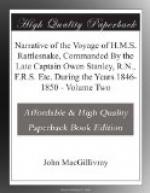On consulting Jackey about going to the camp where the three men were left, he said it was no use going there; the distance was great, and the country scrubby, and that he was sure if any of the men were alive, they would be on the seacoast. Dunn, one of the men, told him, if Costigan died, he should come down to the beach directly. I therefore considered all that we could do would be to thoroughly examine the coast with the whaleboat, close in shore, and the brig as near as she prudently could approach.
At daylight despatched the whaleboat, in charge of the second officer, with four seamen, Jackey, and his two companions, with particular orders to keep close to the beach, and to land occasionally, to examine all the native camping places and canoes; to make strict search for anything that might tend to point out the fate of the unfortunate men. At 6.30 A.M. weighed, with a light breeze from the southward, and steered to pass between the Bird and Macarthur Islands; at noon abreast of the latter; P.M., after passing Hannibal Isles, hauled in for the shore, for the purpose of picking up the whaleboat. At 5.30 P.M., having shoaled our water rather suddenly to 3 1/2 fathoms, hard bottom, anchored about a mile off shore. Saw a canoe and a few natives on the beach. Bearings at anchor—Risk Point, South 1/2 East; the centre of the Hannibal Isles, South-East by East 1/2 East. At eight P.M. the boat returned. The second officer made the following Report:
I kept close along the beach all day, landed three times; first, near the creek where the Ariel’s boat landed, saw no indication there of Europeans. I landed again some distance further on, where I saw a native camp and a canoe. In the latter I found a leather pistol holster, marked 34, which Jackey recognised as belonging to the party. Three natives were seen by Jackey, who, on perceiving the boat, ran into the bush. At the third place I landed I saw no indication of men. I was close to the beach all along, and occasionally fired a musket.
Jackey appears confident that the men left have been killed by the blacks. He said he had hopes of finding Dunn, he being a man that “knew blackfellow well, and used to go along blackfellow.”
Sunday, May 6th, 1849.
At daylight sent the boat on shore, manned as before, with instructions to land at the place where I saw natives last night. At 6.30 A.M., weighed and set the topsail to a light breeze from the southward, steered North by East 1/2 East, hauling out a little from the land. At seven heard a rumbling noise, looked over the vessel’s side and saw we were in shoal water, the vessel gradually losing her way, but still continued forging ahead a little; lowered the boat and sounded round, found more water ahead, thirteen and fourteen feet; inshore, about half a cable’s length found five and six fathoms; to seaward, eleven and eleven and a half feet. Set the foresail: having a flowing tide the vessel went ahead and deepened




